Related Research Articles

The Nuremberg trials were held by the Allies against representatives of the defeated Nazi Germany for plotting and carrying out invasions of other countries across Europe and atrocities against their citizens in World War II.

The Doctors' Trial was the first of 12 trials for war crimes of high-ranking German officials and industrialists that the United States authorities held in their occupation zone in Nuremberg, Germany, after the end of World War II. These trials were held before US military courts, not before the International Military Tribunal, but took place in the same rooms at the Palace of Justice. The trials are collectively known as the "subsequent Nuremberg trials", formally the "Trials of War Criminals before the Nuremberg Military Tribunals" (NMT).

A war of aggression, sometimes also war of conquest, is a military conflict waged without the justification of self-defense, usually for territorial gain and subjugation, in contrast with the concept of a just war.

The subsequent Nuremberg trials were twelve military tribunals for war crimes committed by the leaders of Nazi Germany (1933–1945). The Nuremberg Military Tribunals occurred after the Nuremberg trials, held by the International Military Tribunal, which concluded in October 1946. The subsequent Nuremberg trials were held by U.S. military courts and dealt with the cases of crimes against humanity committed by the business community of Nazi Germany, specifically the crimes of using slave labor and plundering occupied countries, and the war-crime cases of Wehrmacht officers who committed atrocities against Allied prisoners of war, partisans, and guerrillas.

The United States of America vs. Friedrich Flick, et al. or Flick trial was the fifth of twelve Nazi war crimes trials held by United States authorities in their occupation zone in Germany (Nuremberg) after World War II. It was the first of three trials of leading industrialists of Nazi Germany; the two others were the IG Farben Trial and the Krupp Trial.
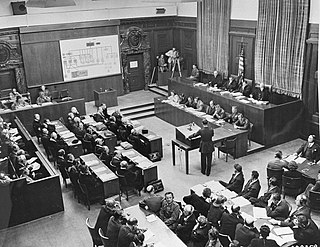
The United States of America vs. Carl Krauch, et al., also known as the IG Farben Trial, was the sixth of the twelve trials for war crimes the U.S. authorities held in their occupation zone in Germany (Nuremberg) after the end of World War II. IG Farben was the private German chemicals company allied with the Nazis that manufactured the Zyklon B gas used to commit genocide against millions of European Jews, Roma, homosexuals, socialists and other innocent civilians in the Holocaust.

The Einsatzgruppen trial was the ninth of the twelve trials for war crimes and crimes against humanity that the US authorities held in their occupation zone in Germany in Nuremberg after the end of World War II. These twelve trials were all held before US military courts, not before the International Military Tribunal. They took place in the same rooms at the Palace of Justice. The twelve US trials are collectively known as the "Subsequent Nuremberg trials" or, more formally, as the "Trials of War Criminals before the Nuremberg Military Tribunals" (NMT).
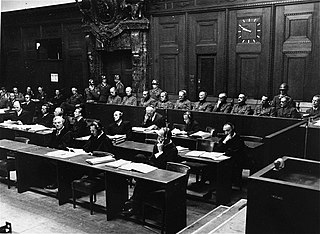
The Hostages Trial was held from 8 July 1947 until 19 February 1948 and was the seventh of the twelve trials for war crimes that United States authorities held in their occupation zone in Germany in Nuremberg after the end of World War II. These twelve trials were all held before US military courts, not before the International Military Tribunal, but took place in the same rooms at the Palace of Justice. The twelve US trials are collectively known as the "Subsequent Nuremberg Trials" or, more formally, as the "Trials of War Criminals before the Nuremberg Military Tribunals" (NMT).
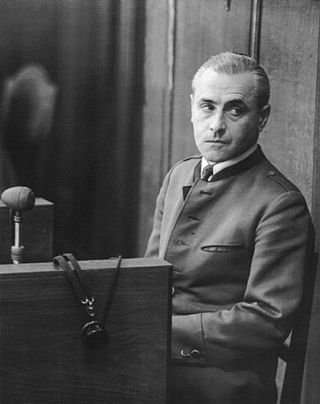
The High Command Trial, also known initially as Case No. 12, and later as Case No. 72, was the last of the twelve trials for war crimes the U.S. authorities held in their occupation zone of Germany in Nuremberg after the end of World War II. These twelve trials were all held before U.S. military courts, not before the International Military Tribunal, but took place in the same rooms at the Palace of Justice. The twelve U.S. trials are collectively known as the "subsequent Nuremberg trials" or, more formally, as the "Trials of War Criminals before the Nuremberg Military Tribunals" (NMT).

The Ministries Trial was the eleventh of the twelve trials for war crimes the U.S. authorities held in their occupation zone in Germany in Nuremberg after the end of World War II. These twelve trials were all held before U.S. military courts, not before the International Military Tribunal, but took place in the same rooms at the Palace of Justice. The twelve U.S. trials are collectively known as the "Subsequent Nuremberg Trials" or, more formally, as the "Trials of War Criminals before the Nuremberg Military Tribunals" (NMT).
The SS Main Office was the central command office of the Schutzstaffel (SS) in Nazi Germany until 1940.

Serge Brammertz is a Belgian prosecutor, academic and jurist. He serves as the chief prosecutor for the International Residual Mechanism for Criminal Tribunals (IRMCT) since 2016. He also served as the chief prosecutor for the International Criminal Tribunal for the former Yugoslavia (ICTY) from 2008 until its closure in 2017.
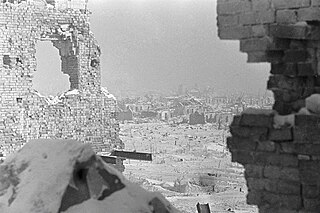
A crime of aggression or crime against peace is the planning, initiation, or execution of a large-scale and serious act of aggression using state military force. The definition and scope of the crime is controversial. The Rome Statute contains an exhaustive list of acts of aggression that can give rise to individual criminal responsibility, which include invasion, military occupation, annexation by the use of force, bombardment, and military blockade of ports. In general, committing an act of aggression is a leadership crime that can only be committed by those with the power to shape a state's policy of aggression, as opposed to those who discharge it.

Gabrielle Louise McIntyre (Australian) is an international legal practitioner, jurist, and served as the Chairperson of the Seychelles' Truth, Reconciliation and National Unity Commission.
Gregory S. Gordon is an American professor and scholar of international law and former Legal Officer for the Office of the Prosecutor of the ICTR. Gordon is known for his academic work calling for the criminalization under international law of a broader category of speech likely to cause and/or fuel mass atrocities, and his book Atrocity Speech Law: Foundation, Fragmentation, Fruition in which he advances this argument.
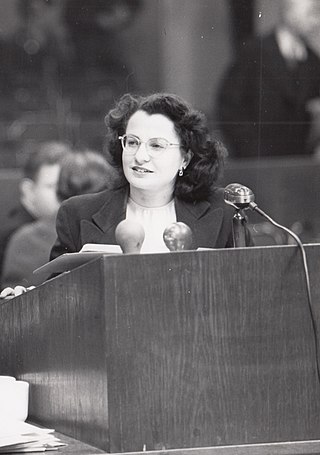
Cecelia Helen Goetz was an American lawyer and bankruptcy judge who served as a prosecutor at the Nuremberg trials.
Kim Christian Priemel is a historian of Germany and former professor at Humboldt University Berlin; he now works for the University of Oslo.
Complicity in genocide is illegal under international law both for individuals, as part of international criminal law, and state parties to the Genocide Convention. The latter was first held in the Bosnian genocide case (2007) in which the International Court of Justice held Serbia responsible for failure to prevent the Bosnian genocide.
Opinio Juris is a blog dedicated to the informed discussion of international law by and among academics, practitioners and legal experts, published independently in cooperation with the International Commission of Jurists. It is one of the leading international law blogs.
The proposed International Criminal Tribunal for the Russian Federation is a proposed ad hoc international criminal tribunal aimed at prosecuting the Russian Federation and senior Russian and Belarusian leaders for the Russian invasions of Ukraine as one or more crimes of aggression, as a complement to the existing International Criminal Court investigation in Ukraine. Several international bodies announced their support for its establishment, including the Council of Europe, the European Commission, the NATO Parliamentary Assembly and the European Parliament.
References
- ↑ "Professor Kevin Jon Heller". ANU College of Law. Archived from the original on 18 August 2023. Retrieved 8 April 2022.
- ↑ https://www.icc-cpi.int/sites/default/files/2024-05/Bio-Kevin-Heller-eng.pdf.
{{cite web}}: Missing or empty|title=(help) - ↑ "About". Opinio Juris. 2008-07-03. Retrieved 2022-11-16.
- ↑ Aksenova, M. (2012). "Kevin Jon Heller and Markus D. Dubber (eds), The Handbook of Comparative Criminal Law". Journal of International Criminal Justice. 10 (3): 709–711. doi:10.1093/jicj/mqs024.
- ↑ Chen, Siyuan (2011). "Review of The Handbook of Comparative Criminal Law - The Handbook of Comparative Criminal Law. Edited by Kevin J Heller & Markus D Dubber (Stanford, California: Stanford Law Books, 2011.) [660 pp. Hardcover: US$90]". Asian Journal of Comparative Law. 6: 1–5. doi:10.1017/S2194607800000508.
- ↑ Zaibert, Leo (2012). "Why Compare? Comments on Kevin Jon Heller and Markus D Dubber's The Handbook of Comparative Criminal Law". University of Toronto Law Journal. 62 (2): 277–292. doi:10.3138/utlj.62.2.277.
- ↑ "Kevin Jon Heller and the Historical Legacy of the U.S. Nuremberg Military Tribunals (NMT)". Opinio Juris. 31 October 2011.
- ↑ "The Legacy of the Nuremberg Military Tribunals in International Humantarian Law". Opinio Juris. 1 November 2011. Retrieved 8 April 2022.
- ↑ "The Nuremberg Military Tribunals and Contemporary International Criminal Law". Opinio Juris. 2 November 2011. Retrieved 8 April 2022.
- ↑ Dapo Akande, Peggy McGuinness and (31 October 2011). "Book Discussion: Kevin Jon Heller, Nuremberg Military Tribunals and the Origins of International Criminal Law". EJIL: Talk!.
- ↑ "The NMT Trial Program and The Emergence of a Jurisprudence of Atrocity". Opinio Juris. 17 November 2011. Retrieved 8 April 2022.
- ↑ "Book Review: The Nuremberg Military Tribunals and the Origins of International Criminal Law by Kevin Jon Heller". LSE Review of Books. 15 April 2013. Retrieved 8 April 2022.
- ↑ Phillips, R. L. (2012). "Kevin Jon Heller, The Nuremberg Military Tribunals and the Origins of International Criminal Law". Journal of International Criminal Justice. 10 (2): 492–495. doi:10.1093/jicj/mqs011.
- ↑ Palmer, Nicola (1 December 2012). "Book Review: The Nuremberg Military Tribunals and the Origins of International Criminal Law (Kevin Jon Heller), (Oxford University Press, 2011)". Social Science Research Network. SSRN 2635514.
{{cite journal}}: Cite journal requires|journal=(help) - ↑ Kendall, Sara (2012). "The Nuremberg Military Tribunals and the Origins of International Criminal Law by Kevin Jon Heller; Beyond Victor's Justice - The Tokyo War Crimes Trial Revisited Edited by Yuki Tanaka, Tim McCormack and Gerry Simpson". Melbourne Journal of International Law. 13: 349.
- ↑ "Book Reviews". International Journal of Legal Information. 40: 599. 2012.
- ↑ Pendas, Devin O. (2012). "The Nuremberg Military Tribunals and the Origins of International Criminal Law by Kevin Jon Heller [Oxford University Press, Oxford, 2011, 509 pp, ISBN 978-0-19-955431-7, £70.00 (h/bk)]". International and Comparative Law Quarterly. 61 (2): 551–553. doi:10.1017/S0020589312000139. S2CID 145450980.
- ↑ Keele, Benjamin J. (2012). "The Nuremberg Military Tribunals and the Origins of International Criminal Law. By Kevin Jon Heller. Oxford; New York: Oxford University Press, 2011. Pp. xviii, 509. ISBN: 978-0-19-955431-7. US$135.00". International Journal of Legal Information. 40 (3): 599–600. doi:10.1017/S073112650001146X. S2CID 159428640.
- ↑ Burghardt, Boris; Schellhaas, Fabian (2013). "Kevin Jon Heller, The Nuremberg Military Tribunals and the Origins of International Criminal Law (Oxford University Press, 2011) ISBN 978-0-19-955431-7, 536 pp". International Criminal Law Review. 13 (2): 493–503. doi:10.1163/15718123-01302005.
- ↑ Douglas, L. (2012). "The Nuremberg Military Tribunals and the Origins of International Criminal Law, Kevin Jon Heller (Oxford: Oxford University Press, 2011), xviii + 509 pp., hardback, $135.00". Holocaust and Genocide Studies. 26 (2): 306–308. doi:10.1093/hgs/dcs040.
- ↑ Rose, C. (2012). "The Nuremberg Military Tribunals and the Origins of International Criminal Law. By KEVIN JON HELLER". British Yearbook of International Law. 82 (1): 528–530. doi:10.1093/bybil/brs037.